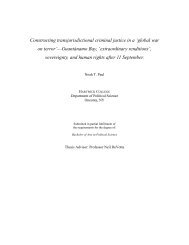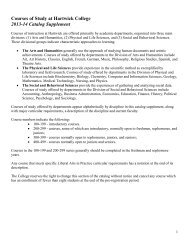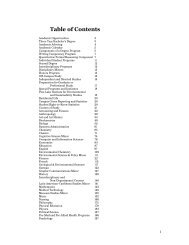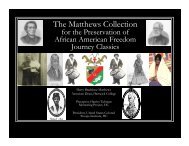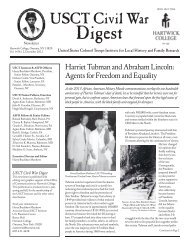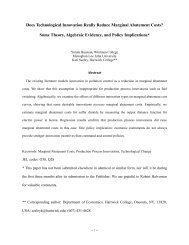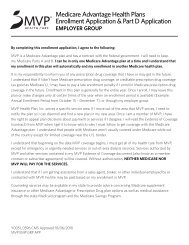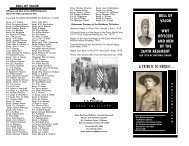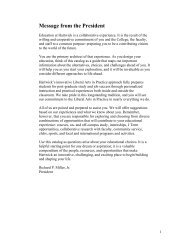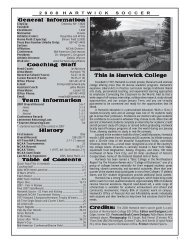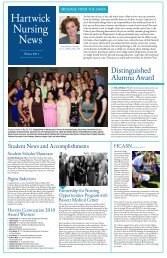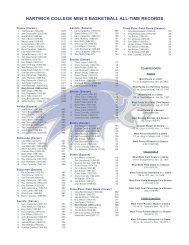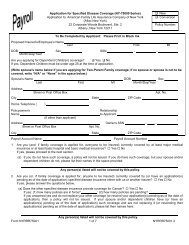Table of Contents - Hartwick College
Table of Contents - Hartwick College
Table of Contents - Hartwick College
You also want an ePaper? Increase the reach of your titles
YUMPU automatically turns print PDFs into web optimized ePapers that Google loves.
interdependence and inter-state inequality are highlighted. Prerequisite:<br />
Posc 203 or 235 or permission <strong>of</strong> instructor. Offered every third year.<br />
(SBA)<br />
C. Comparative Politics<br />
208 Russian and East European Politics (3 credits) An evaluation<br />
<strong>of</strong> the history, politics, and economics <strong>of</strong> Russia, its “near abroad” (the<br />
Commonwealth <strong>of</strong> Independent States), and selected countries in Eastern<br />
Europe. The impact <strong>of</strong> the Communist Revolution on these countries is<br />
considered, as is the Cold War, and Russian foreign policy toward these<br />
states. Prerequisite: Posc 105. Typically <strong>of</strong>fered alternate years. (SBA)<br />
228 European Politics (3 credits) A study <strong>of</strong> national and regional<br />
(EU) political systems and institutions in West and Central Europe during<br />
and since the Cold War, with focus on political volatility, transitions and<br />
alignments coming in response to changing regional and global economic,<br />
ideological, cultural and social realities. Prerequisite: Posc 105 is<br />
recommended. Typically <strong>of</strong>fered alternate years. (SBA)<br />
238 South Asian Politics (3 credits) A study <strong>of</strong> the politics <strong>of</strong> India, Sri<br />
Lanka, Pakistan, Bangladesh, and Afghanistan, including consideration <strong>of</strong><br />
issues such as democratic and authoritarian governance, foreign affairs,<br />
nuclear security, and ethnicity and nationalism. Students focus<br />
specifically on the two-decades-old ethnic conflict in Sri Lanka, the<br />
separatist and terrorist movements in India’s Kashmir, the long-standing<br />
conflict between India and Pakistan, the rise <strong>of</strong> the Taliban and the war<br />
against terrorism in Afghanistan, and military rule and the prospects for<br />
democratic governance in Pakistan. Typically <strong>of</strong>fered alternative years.<br />
Prerequisite: Posc 105 or PM. (NTW) or (SBA)<br />
248 Middle East Politics (3 credits) An examination <strong>of</strong> factors shaping<br />
political systems in the Middle East and North Africa, with special focus<br />
on global contexts, resource politics, economic change, women’s status,<br />
and political transitions. While studying the politics <strong>of</strong> individual states<br />
and sub-regions within the MENA states, students will explore the rich<br />
cultural history <strong>of</strong> the region, and examine the impact on politics <strong>of</strong> ethnic<br />
and racial diversity, regional income gaps, religious diversity, and radical<br />
Islam. Posc 105 is recommended. Typically <strong>of</strong>fered alternate years. (NTW)<br />
or (SBA)<br />
268 Latin American-Caribbean Politics (3 credits) A survey <strong>of</strong> post-<br />
World War II politics in Latin America and the Caribbean, with special<br />
attention to the changing political and economic policies and prospects <strong>of</strong><br />
these states. The effects <strong>of</strong> history, culture and international contacts on<br />
local institutions are examined, as is the dynamism <strong>of</strong> grassroots<br />
movements for change in the region. Prerequisite: Posc 105 would be<br />
helpful, or any LACS course. Typically <strong>of</strong>fered alternate years. (NTW) or<br />
(SBA)<br />
278 East Asian Politics (3 credits) An examination <strong>of</strong> the politics <strong>of</strong><br />
China, Japan, Korea, Taiwan, and several other states in the region.<br />
Students will evaluate these states’ politics and economies during the<br />
20th century with a special focus on the post-WWII period. The course<br />
will focus on these states’ transition to market economies, the transition<br />
to and consolidation <strong>of</strong> democracy, the nature and impact <strong>of</strong> civil society,<br />
and major challenges facing these states in the twenty-first<br />
209



